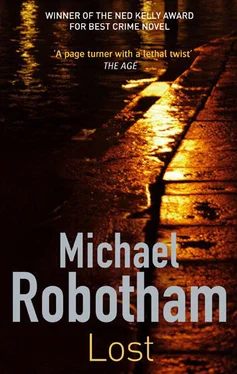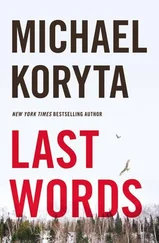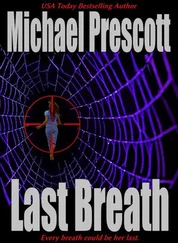Ali rolls her eyes. Mrs. Barba directs a question at me. “Do you have any children, Inspector?”
“Two.”
“You're divorced, aren't you?”
“Twice. I'm trying for third time lucky.”
“That is sad for you. Do you miss your wife?”
“Yes, but my aim is improving.”
The joke doesn't make her smile. She puts a fresh cup of tea in front of me. “Why didn't your marriage work out?”
Ali looks horrified. “You don't ask questions like that, Mama!”
“That's all right,” I say. “I don't really know the answer.”
“Why not? My daughter says you are very clever.”
“Not in matters of the heart.”
“It's not hard to love a wife.”
“I could love one, I just couldn't hold on to her.”
Without realizing how it happens, I'm telling her how my first wife, Laura, died of breast cancer at thirty-eight and my second wife, Jessie, left me when she realized that marriage wasn't just for the weekend. Now she's in Argentina filming a documentary about polo players and most likely shagging one of them. And my current wife, Miranda, packed her bags because I spent more time in the office than I did at home. It sounds like a soap opera.
Mrs. Barba picks up on the melancholy note in my voice when I talk about Laura, who should have been my childhood sweetheart because then I would have known her longer than fifteen years. We deserved more. She deserved more.
One thing leads to another and soon I'm telling her about the twins—how Claire is dancing in New York and every time I see her disfigured toes I feel like arresting everyone at the New York City Ballet; and the last I heard from Michael he was crewing on charter yachts in the Caribbean.
“You don't see much of them.”
“No.”
She shakes her head and I wait for a lecture on parental responsibility. Instead, she pours another cup of tea and begins talking about her children and her faith. She doesn't see any difference between races or genders or religions. Humanity is all the same except in some countries where life is held more lightly and hatred gets a hearing.
Ali apologizes again for her mother when we get outside.
“I thought she was very nice.”
“She drives me crazy.”
“Wanna swap?”
We have changed vehicles since yesterday. Ali has borrowed a car from one of her brothers. I know it is part of her training—never using the same vehicle or driving the same route two days in a row. People spend years learning this stuff. I wonder what happens to them afterward. Are they frightened of the world just like Mickey Carlyle?
Edging through the traffic, north along the Edgware Road, I feel a sense of expectation. The uncertainty could end today. Once I find Rachel she'll tell me what happened. I might not remember but I'll know.
We cross a railway bridge and turn right into an industrial area, full of car-repair shops, wrecker yards, spray painters and engineering workshops. Pigeons pick at the trash behind a café.
The road runs out and we pull up on a patch of wasteland littered with rusting drums, broken chimney pots, fence posts and scaffolding. An abandoned freezer, pockmarked by stones, rises above the weeds.
“This is where they found Rachel. She was sitting in the passenger seat of a stolen car,” says Ali, studying an ordinance survey map on her lap. “The car was reported missing the previous evening from a multistory parking garage in Soho.”
The skies have cleared and the sun is shining strongly, reflecting off the puddles. Climbing out of the car, I walk toward the freezer, moving gingerly across the broken ground. The nearest factory or warehouse is fifty yards away. London is littered with sites like this one. People imagine high-density living with every spare foot being utilized, but there are thousands of empty warehouses, vacant blocks and patches of waste ground.
I don't know what I expected to find. Answers. Witnesses. Something familiar. Everybody leaves a trail. The ridiculous thing is, I can't look at a vacant lot without thinking what crops might grow there. I'm in the middle of a vast city and I'm thinking about barley and rapeseed.
“Why can't I remember any of this?”
“You might never have been here,” says Ali. “Rachel abandoned her car three miles from here.”
“I would have followed her.”
“How?”
“I don't know.”
Finding the smoothest path through the weeds and rubble, she moves ahead of me until we reach a wire fence. Beyond are railway tracks—the Bakerloo line. The ground trembles as a train rattles past.
Turning left at the fence, we come to a pedestrian footbridge over the tracks. The platforms of Kilburn Station are partially visible to the north. The dual tracks have weeds growing at the edges and rubbish has collected in the ditches.
It's a good location to drop a ransom. Quiet. The factories and warehouses would have been empty at night. There are major roads leading north and south. The railway line runs east-west. Ten minutes traveling in any direction would put someone miles away.
“I need you to get hold of the incident logs from the local police stations,” I tell Ali. “I want to know everything that happened that night within a two-mile radius—burglaries, assaults, parking tickets, broken streetlights, whatever you can find.”
“What are you looking for?”
“I'll tell you when I find it.”
The Royal Free Hospital in Hampstead is less than half a mile from where Rachel's car was abandoned and three miles from where she was found. Ali waits outside while I go through the main doors.
The receptionist is in her fifties with reddish-brown hair pinned tightly to her skull. She might be a nurse but it's hard to tell without a uniform.
“I'm Detective Inspector Ruiz. I need some information about a woman who was treated here two weeks ago.” I notice her name tag and add, “Thank you very much, Joanne.”
She straightens and touches her hair.
“Her name is Rachel Carlyle. She was brought in by the police.”
Joanne is leaning on her elbows, looking at me.
“Perhaps you should check on the computer,” I suggest.
Blushing slightly, she turns to the keyboard. “I'm afraid Miss Carlyle is no longer a patient.”
“Why was she admitted?”
“I'm afraid I can't give you that sort of information.”
“What day did she check out?”
“Let me see . . . September 29.”
“Do you know where she went?”
“Well, there is an address . . . I'm not sure . . .”
I know what she's going to say. She's going to ask for some official identification or a letter of authority. I no longer have a badge.
Then I notice her staring at my hands, in particular my Gypsy ring. It's fourteen-karat yellow gold, mounted with a champagne colored diamond. According to Daj it belonged to my grandfather, although I don't know how she knows this or how she managed to recover it from Auschwitz.
People are superstitious about Gypsies. My mother used to play on it. At school fetes and local fairs she would set down her cloth-covered table and shuffle the tarot cards, telling fortunes at a few quid a time. Private readings were conducted in the cottage parlor, with the curtains drawn and incense stinking the air.
“The dead come back through children,” Daj would say. “They steal their souls.”
None of this crap about Gypsy curses and fortune-telling impressed me but sometimes when I interview a suspect, I notice them grow suddenly anxious when they see my ring. They look just like Joanne does now.
Her eyes move to my left hand—the one missing a finger.
“A bullet did that,” I say, holding it up for her. “Sometimes I think the finger is still there. It itches. You were going to give me the address.”
Читать дальше












